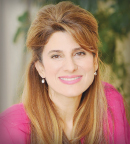
Princess Dina Mired
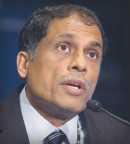
Anil D’Cruz, MD
In October 2020, Her Royal Highness Princess Dina Mired of Jordan ended her 2-year tenure as President of the Union for International Cancer Control (UICC), a global organization with more than 1,198 members from 172 countries and territories committed to reducing the cancer burden and inequitable access to care worldwide. However, her dedication to pursuing health equity for patients with cancer, especially children, is continuing.
Anil D’Cruz, MD, Director of Oncology Apollo Hospitals in Mumbai, India, is the President of the UICC for the 2020–2022 term.
The first Arab Muslim and nonmedical professional to be elected President of the UICC, Princess Dina’s journey as a staunch patient advocate began decades before she took the global stage as a champion of universal health coverage to guarantee access to essential, quality health services, which the World Health Organization (WHO) has deemed a fundamental human right.1
Her unwavering determination to succeed is personal. In 1997, Princess Dina’s son, Prince Rakan bin Mired, was diagnosed with acute lymphoblastic leukemia just before his second birthday, and the family had to travel to the United States for a lifesaving bone marrow transplant at Dana-Farber Cancer Institute, Boston. Such a trip would have been out-of-reach for patients with fewer financial resources.
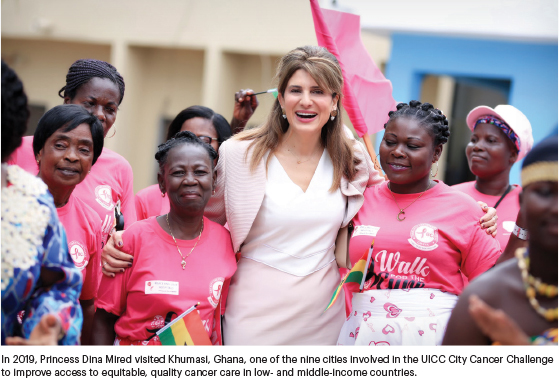
“I can only imagine what it would have been like if we were financially challenged and had been faced with a no-option treatment for a disease that has a cure,” said Princess Dina. “As the mother of a cancer survivor, patient advocacy is not a career. It is personal. It is who I am.”
In 1998, His Majesty King Hussein of Jordan was diagnosed with non-Hodgkin lymphoma and also had to seek treatment in the United States. He died the following year. According to Princess Dina, it was King Hussein’s dream to have a comprehensive cancer center of excellence in Jordan that would treat not just Jordanians, but patients from the surrounding region as well.
“My regret is the lockdown caused by the coronavirus pandemic is disrupting cancer care in immeasurable ways and will have consequences for a long time.”— Princess Dina Mired
Tweet this quote
In 2002, Princess Dina was named Director General of the King Hussein Cancer Foundation, a post she held until 2016. During that time, Princess Dina was part of the team that helped transform the King Hussein Cancer Center into a world-class comprehensive cancer center serving patients in Jordan and in neighboring countries in the Middle East and North Africa, where the incidence of cancer is expected to nearly double from 555,000 cases in 2012 to 961,000 by 2030.2 The cancer center now has accreditation from the College of American Pathologists and the Joint Commission International as a disease-specific cancer center and has international partnerships with The University of Texas MD Anderson Cancer Center, St. Jude Children’s Research Hospital, and the National Cancer Institute, among others.
Looking Ahead
With the completion of her term as President of the UICC, Princess Dina has taken on several new advocacy roles. She was recently named the first Patron of the International Society of Paediatric Oncology, which has recently joined forces with the WHO’s Global Initiative for Childhood Cancer. She is also a member of WHO’s Expert Technical Group to Accelerate the Elimination of Cervical Cancer and its Civil Society Working Group on Noncommunicable Diseases as well as a special advisor to Vital Strategies, a New York City–based global public health organization. As Immediate Past-President of UICC, Princess Dina will also remain engaged in the UICC community.
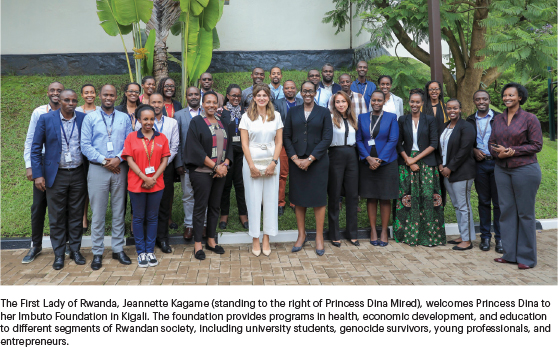
The ASCO Post recently talked with Princess Dina about her achievements during her tenure as President of the UICC, the challenges the organization faced during the COVID-19 pandemic, and her future goals to bring universal health coverage and access to high-quality cancer care to low- and middle-income countries.
Making a Difference
You set several ambitious goals during your tenure as President of UICC, including making noncommunicable disease prevention a global priority and improving cancer outcomes, especially in low- and middle-income countries. How would you assess the progress you have made over the past 2 years in these areas?
One of my main goals was to continue the movement of putting cancer and other noncommunicable diseases at the forefront as a global priority. I especially wanted to flesh out the advocacy messages that were in place from the perspective of someone who has been through the cancer experience, as the mother of a cancer survivor, and, in a way, bring the patient perspective to my role. I also wanted to bring in the perspective of someone who comes from a low- and middle-income country, like Jordan. Last, but not least, I wanted to use my experience as someone who has been part of the solution to improve cancer care for patients.
As former Director General of the King Hussein Cancer Foundation, I was part of the team that transformed our hospital, the King Hussein Cancer Center, from one that was tantamount to a morgue, because so many patients died, to one that is now among the best cancer centers, not only in our region, but that is accredited internationally. So, in a way, I was able to bring in the voice from the developing world. I was able to add extra authenticity to the programs UICC was supporting, so what we were proposing was not based on theory but on personal experience. After all, I’ve witnessed firsthand the lack of access to cancer care.
I dedicated my whole tenure at UICC, first as President-Elect and then as President, to travel across the world to engage with the cancer community. I have made more than 50 trips to 5 continents over the past 3 years. I’ve met with 33 world leaders from 24 countries, including heads of state, health ministers, and leaders of nongovernmental organizations and civil society. When I couldn’t travel to a country in person, I participated in video conferencing calls to keep on advocating for patients with cancer in extremely challenging circumstances and bringing media attention to UICC programs.
I wanted to use my platform as President of UICC and as a Princess of Jordan to reach out to people in power to keep the enormity of the disproportionate effect that noncommunicable diseases have on people living in low- and middle--income countries front-and-center. I hope I delivered on that goal.
I am proud to have been part of the UICC effort to push forward the City Cancer Challenge (C/Can) 2025 initiative (https://citycancerchallenge.org/about-us/), whose goal is to increase access to quality cancer care in low- and middle-income countries and reduce deaths from cancer by 25% by 2025. I traveled to the three pilot cities that were going through the C/Can process (Kumasi, Ghana; Asunción, Paraguay; and Cali, Colombia) to try to convince political leaders and influencers of cancer care to put their weight behind this initiative. Now, C/Can is a stand-alone foundation, and its programs have been established in nine cities, reaching nearly 44 million people.
In 2018, I was proud to deliver the keynote speech at the third high-level meeting on noncommunicable diseases at the United Nations as an “Eminent Champion of NCDs.” That year, I also worked with UICC members and partners in calling for national commitments to approve the WHO’s 2020–2030 global strategy to eliminate cervical cancer. The strategy was formally adopted in August 2020.
We’ve accomplished a lot over the past 4 years to move the needle further along to make cancer a global priority to improve patient outcomes.
Coping With Cancer: A Shared Human Experience
What goals do you regret not being able to accomplish?
First of all, there is nothing to regret, because our work is really an ongoing movement, a process, and a hard journey. I feel my mission was to deepen the urgency of reducing the global cancer burden and challenge government leaders to commit to this effort, and I hope I contributed in a small way to that effort.
I’ve been very blessed and very rewarded to be able to see firsthand the many cancer organizations and communities across five continents working day-in and day-out in extremely challenging circumstances to improve access to quality cancer care for every patient. It has been heartening to confront the fact that, outside of politics, country borders, economic status, and ethnicity, we are all essentially the same. I know we know that in the abstract, but to personally experience that reality is another story.
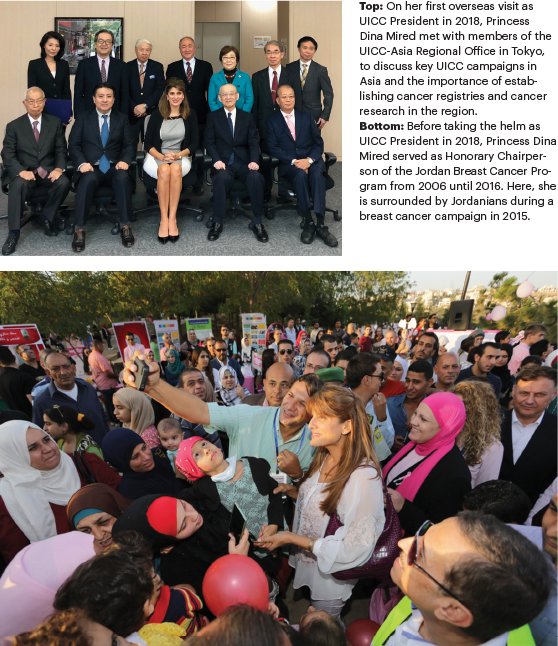
I will say that 2020 was looking to be a very good year for galvanizing our global efforts, including the call to action by the WHO to accelerate the elimination of cervical cancer, which is responsible for more than 300,000 deaths each year.3 But then the COVID-19 pandemic diverted all that attention and stopped many activities. For example, even though the United Nations adopted WHO’s Global Strategy on the Elimination of Cervical Cancer, the news did not get the attention it deserved because of the world’s total focus on the pandemic. So, my regret is the lockdown caused by the coronavirus pandemic is disrupting cancer care in immeasurable ways and will have consequences for a long time.
COVID-19 has been the ultimate revealer about the inequities in health care that we in the global health community have known and spoken about for a long a time. The pandemic has exposed to an even greater degree the deficiencies in health-care systems, including a lack of medical infrastructure; inaccessibility to universal health coverage; and shortages of medical providers, medicines, and equipment (especially in low- and middle-income countries). It took the COVID-19 pandemic to equalize the misery experienced by millions of the unfortunate among us and to “unmask” and reveal this collective apathy to the very issues that are the daily lot of millions of disadvantaged patients with cancer, particularly in poorer and middle-income countries, but also at times within wealthier ones as well.
The pandemic has also diverted financial resources from our efforts, which is upsetting. As devastating as the coronavirus is, cancer and other noncommunicable diseases are still the largest killer globally, but we are doing the best we can.
Attaining the Goal of Universal Health Care
A main component of the UICC mission is to help countries achieve implementation of universal health care so patients with life-threatening diseases like cancer will have access to affordable services. Are you seeing more countries adopt a form of universal health care for their citizens?
Yes, absolutely. Many countries finally understand that, contrary to the belief that universal health coverage is only for rich countries, low- and middle-income countries now realize universal health care is achievable once waste and inefficiencies in the health-care system are removed. The theme of our 2019 World Cancer Leaders’ Summit in Nur-Sultan, Kazakhstan, was “Cancer and Universal Health Coverage.”
During the summit, we discussed the need for sustainable, person-centered health systems, effective prevention and early detection programs, and innovative ways to ensure access to affordable cancer care for people everywhere. We drove home the message that cancer and other noncommunicable diseases have to be part of the universal health-care package if we want to achieve the goal of leaving no one behind. I’m seeing that more and more countries are now committed to adopting universal health coverage for their citizens.
Tackling Two Health-Care Epidemics
If current trends continue, WHO is predicting the world will see a 60% increase in cancer cases over the next 2 decades, with the greatest increases occurring in low- and middle-income countries, where survival rates are lowest.4 According to The Cancer Atlas, Third Edition, progress against cancer is achievable through prevention strategies, including tobacco cessation programs, better diet, weight reduction, screening, vaccination programs to prevent cancers (such as cervical cancer), and reducing air and water pollution.5 How realistic is it that low- and middle--income countries will be able to achieve these goals given financial resources and political will?
The interesting thing is that The Cancer Atlas was published in 2019, just before the COVID-19 pandemic began spreading across the world. The Cancer Atlas spotlighted the withstanding high burden of cancer globally, especially in low- and middle-income countries. Now, add to that the destructive effect of COVID-19, and we can safely assume a significant increase in cancer deaths globally. We already know the pandemic is causing delays in cancer screening, detection, and treatment as well as slowing research. There have been studies published in The Lancet Oncology6 and in other scientific journals predicting increases in cancer deaths as a result of diagnostic delays because of COVID-19.
I hope that among the lessons we learn from the COVID-19 pandemic is that if countries want to reduce their incidence of noncommunicable diseases, they are going to have to transition their health-care systems from one based on sickness and disease to one focused on prevention and wellness. The economic argument for not tackling the complexity of care for noncommunicable diseases, especially cancer, has always been that it is too costly, but the health community has proven that premise wrong.
The fact is, if countries follow the WHO prioritization of “best buys” and other recommended interventions for the prevention and control of noncommunicable diseases and its essential medicines list, by 2030, not only will we have saved millions of lives, for every dollar spent, we will see a return of $7 per person, per year, generating $350 billion in economic growth.7
In my travels to countries like Rwanda, for example, I’ve seen governments investing more in cancer control plans, which was never the case before. As a result, today, two-thirds of African countries have national cancer control plans, which can help them identify, prioritize, and implement the most effective actions to prevent cancer, including enforcing tobacco control.
Are we making enough progress? We were making progress before the COVID-19 pandemic, but the question is whether it was considerable or fast enough? I believe the pace was not fast enough to make a real dent for us to reach our target of reducing mortality from cancer by 25% in the year 2025.
Despite a worldwide pandemic, which has diverted our attention and resources from cancer control, we, as the global cancer community, are still moving ahead with our priorities. They include elimination of cervical cancer through increasing coverage of vaccination against the human papillomavirus (HPV), increasing screening coverage with an HPV test, and managing the care of women who have screened positive.
So, we are not stopping our efforts and commitment to reducing the global cancer burden. It would be criminal if we rolled back all of the progress we have made over the past few years. Despite the gloom and doom reported in The Cancer Atlas, we are moving forward to continue the gains we have made. Nothing, not even a worldwide pandemic, will stop us.
Planning the Next Steps
Please talk about the responsibilities you will have in your new roles with the International Society of Paediatric Oncology and WHO’s Global Initiative for Childhood Cancer.
As the new Patron for the International Society of Paediatric Oncology and as a mother of a cancer survivor, I hope to focus my advocacy on amplifying the silent voices of the children, especially in low- and middle-income countries, who have been denied the chance to be cured of diseases that are curable in high-income countries. I want to actively support the WHO’s Global Initiative for Childhood Cancer, which aims to save 1 million more children who would otherwise literally die on all our watches! I want to do whatever I can to remind us all that all of God’s children deserve their rightful chance to live to see another day.
In addition, as part of the WHO’s Expert Technical Group to Accelerate the Elimination of Cervical Cancer, I want to lend my support in making the elimination of cervical cancer a reality. Cervical cancer can be prevented with the HPV vaccine and treated successfully when caught early through screening. In 2018, cervical cancer caused the deaths of approximately 311,0003 of our women unnecessarily and prematurely, not because we didn’t have the tools to combat the cancer, but because we did not have the political will. Now, we have no more excuses; we have seen what political will can do. If whole countries can be locked down due to COVID-19, then the elimination of cervical cancer can be done if that same will is invoked. I am going to do my part in making sure that we all collectively work to invoke that political will for the sake of all the 570,0008 women who are suffering now and also for the millions of women who died in pain, all alone.
DISCLOSURE: Princess Dina Mired reported no conflicts of interest.
REFERENCES
1. World Health Organization: Universal health coverage (UHC). Available at www.who.int/news-room/fact-sheets/detail/universal-health-coverage-(uhc). Accessed November 19, 2020.
2. Lyons G, Sankaranarayanan R, Millar AB, et al: Scaling up cancer care in the WHO Eastern Mediterranean Region. East Mediterr Health J 24:104-110, 2018.
3. World Health Organization: Cervical cancer. Available at www.who.int/health-topics/cervical-cancer#tab=tab_1. Accessed November 19, 2020.
4. World Health Organization: WHO outlines steps to save 7 million lives from cancer. Available at www.who.int/news/item/04-02-2020-who-outlines-steps-to-save-7-million-lives-from-cancer. Accessed November 19, 2020.
5. American Cancer Society: The Cancer Atlas. Available at https://canceratlas.cancer.org. Accessed November 19, 2020.
6. Maringe C, Spicer J, Morris M, et al: The impact of the COVID-19 pandemic on cancer deaths due to delays in diagnosis in England, UK: A national, population-based, modeling study. Lancet Oncol 21:1023-1034, 2020.
7. World Health Organization: Saving lives, spending less: A strategic response to noncommunicable diseases. Available at apps.who.int/iris/bitstream/handle/10665/272534/WHO-NMH-NVI-18.8-eng.pdf. Accessed November 19, 2019.
8. World Health Organization: Cervical cancer. Available at www.who.int/health-topics/cervical-cancer#tab=tab_1. Accessed November 19, 2019.

